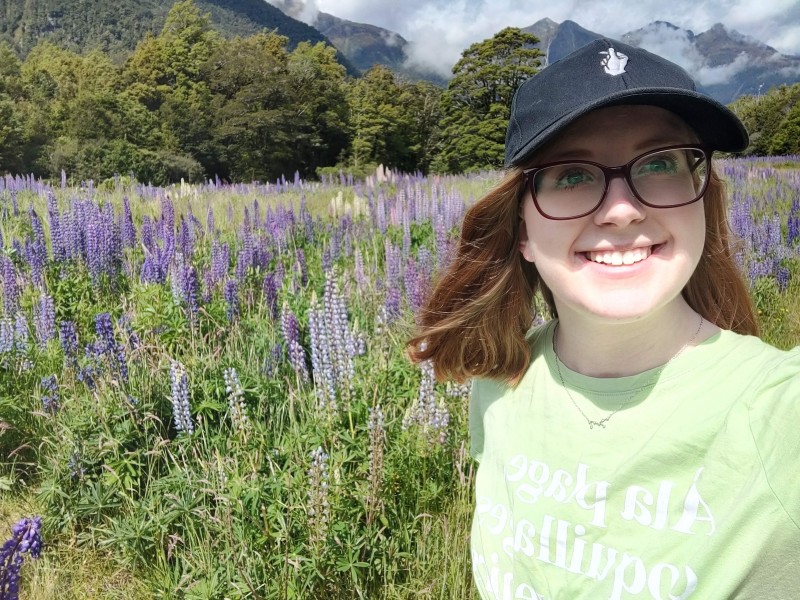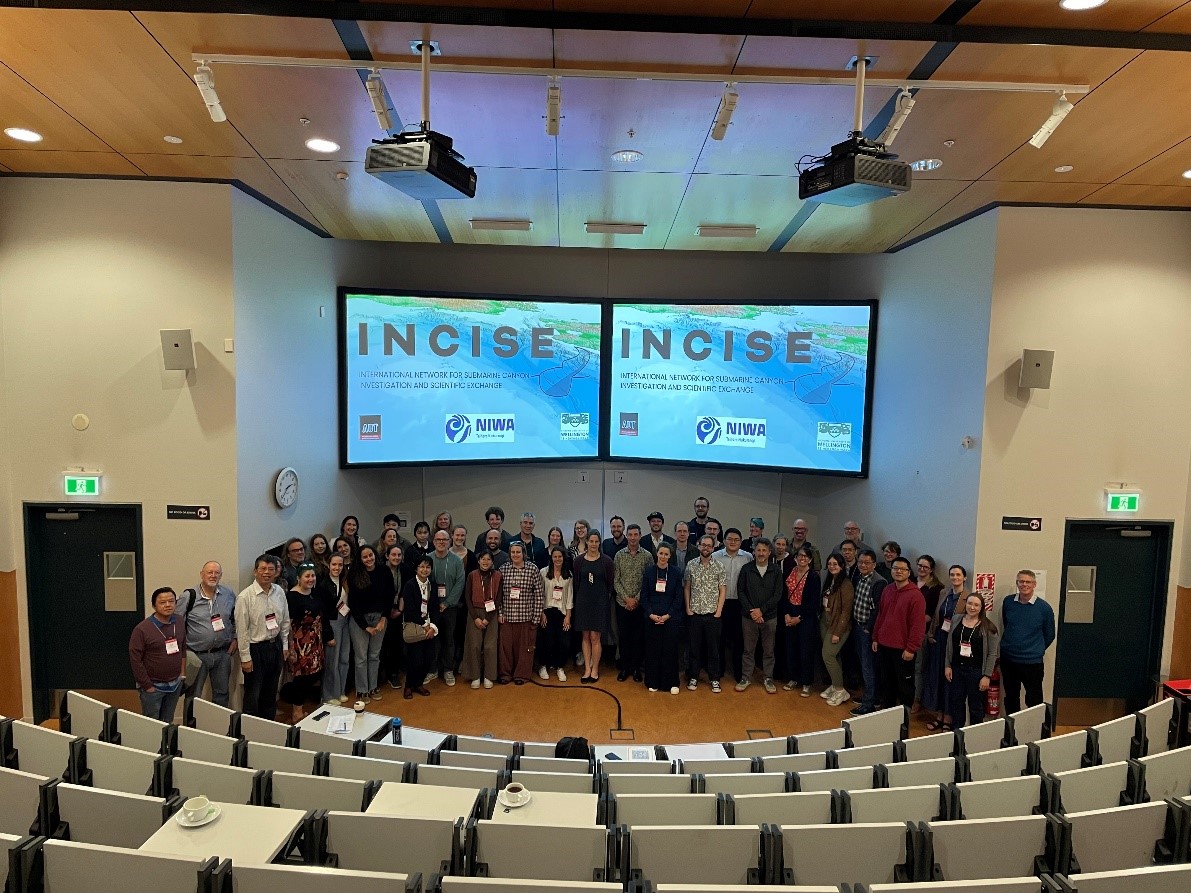The International Network for Submarine Canyon Investigation and Scientific Exchange Symposium 2023
Eilean MacDonald
University of East Anglia

INCISE is a network of scientists who all study different aspects of submarine canyons. The main aim of this network is to create links between different fields in the study of submarine canyons and stimulate cross-disciplinary discussion.
The 2023 INCISE Symposium was the 6th of its kind and this year was hosted by NIWA in Wellington Aotearoa New Zealand, 4th-7th December 2023. The venue was located in the Victoria University of Wellington’s (Te Herenga Waka) Pipitea Campus (Te Papa Akoranga o Pipitea), with a jam-packed programme including, workshops, working group discussions, talks and poster presentations as well as a conference dinner.

My journey began in Norwich on the 1st of December at 8am where I left for Heathrow, 36 hours later at 9am on the 3rd of December I flopped onto the bed in my hotel room in Wellington! My first day in Wellington consisted of mostly catching up on some sleep until later in the evening when I went out for dinner with a group of fellow submarine canyon scientists. This was a nice way to informally meet some of the people I would be spending time with over the next week.
The next day was a pre-symposium workshop on internal waves. This began with a welcome from Veerle Huvenne. The day consisted of talks from several keynote speakers along with interactive sessions. This was very beneficial to me as a large portion of my project is looking at the effects of these internal waves. It not only gave me a greater insight and understanding of internal waves in my sector of oceanography but also enlightened me about other important impacts of internal waves on biogeochemistry and internal wave analysis techniques. The day rounded off with an icebreaker in preparation for the start of the symposium the following day.
Day 1 of the conference began with a welcome from Veerle Huvenne, Joshu Mountjoy and Ashley Rowden. One thing I felt was very special is that the hosts organised for local Maori to welcome us into the space this is called a powhiri. This was followed by a series of talks and flash poster presentations on ‘carbon through canyons’, ‘processes shaping canyons’ and ‘canyon sediment transport’. The day was rounded off with a poster session. This session allowed me to learn more about current research happening outside of my sector in addition to meeting many more members of the community.
Day 2 consisted of the sessions, ‘canyons as havens for biodiversity’ and ‘anthropogenic impacts’ and again was rounded off by a poster session allowing for more discussion. This is one thing I very much enjoyed about this symposium, there was ample opportunity to have informal discussions at lunchtimes, poster sessions and coffee breaks. This added to the friendly feel of the symposium, and I never felt like there was no one I could talk to. After working group discussions, we all joined together later in the evening for a conference dinner which consisted of good food, company and music!
Day 3 was the last day of the symposium, and it rolled around very quickly! The last session was ‘Canyon current dynamics and influence on sediment transport’ and it was the session I was speaking in. I was presenting the research I had done to date on ‘Turbidity Within the Whittard Canyon System’. It was a great opportunity to present my research at this stage as I got some fantastic feedback and suggestions from scientists in a range of sectors. I came away with many new thoughts and ideas not only from discussions about my research but also from presentations throughout the whole symposium. The final session of the symposium was feedback from the 3 working groups in INCISE. Each of these groups works on differing topics to focus on specific questions within fields to advance knowledge as a team. This was another thing I liked about this network, there are shared goals and many groups working together on them from many specialisms. After this, the symposium was closed by Jaime Davies, Veerle Huvenne, Joshu Mountjoy and Ashley Rowden with thanks and the announcement of INCISE 2025!

INCISE was the first conference in my field I have ever attended, and it was amazing in many ways. I learned a lot from my fellow scientists, felt welcomed into a fantastic friendly and thriving community, and got to visit a wonderful country with a beautiful relationship to its natural environment. The organising committee did a fantastic job.
I would like to thank the Challenger Society and INCISE for granting me travel awards so I could attend this event. It was an exciting week of meeting new people, creating new connections and talking about submarine canyons in all aspects! I am very much looking forward to the 7th INCISE Symposium in Barcelona 2025.
Profile
I am a second-year PhD student at the University of East Anglia under the supervision of Rob Hall (UEA), Dorothee Bakker (UEA), Mike Clare (NOC) and Furu Mienis (NIOZ). My research focuses on the question “Can extreme internal waves trigger turbidity currents and carbon transport in submarine canyons?”. Submarine canyons are important systems for sediment and carbon transport acting as conduits from shelf seas to the deep ocean. Turbidity currents are one of the primary down-canyon transport mechanisms, although their triggering processes are not well understood, hence their contributions to the global sediment and carbon budgets are uncertain. A proposed triggering mechanism of these currents are large-amplitude internal waves, which when energetic enough may resuspend enough sediment to form turbidity currents. I aim to use a variety of oceanographic datasets to consider this, and in turn the factors that influence the propagation of such internal waves.
Latest News
Marine Data Management, Governance and the MEDIN toolset
The Marine Environmental Data and Information Network (MEDIN) and OceanWise are delighted to invite you to attend our popular free online training workshop: ‘Marine Data Management, Governance and the MEDIN toolset’ on the 19th – 23rd of May 2025.
Workshop on the contribution of UK Arctic Ocean science to the International Polar Year 32/33
12:00 11th June – 16:00 12th June 2025: NOC Southampton (In-person with online option): Registration deadline 16th May
REGISTER HERE
Pre-meeting questionnaire (open to all)
The purpose of this workshop is for the UK Ocean Science community to discuss and then draft a prospectus document outlining the priority Arctic research questions the community would like to address during the run up to, throughout and beyond the International Polar Year 32/33. Additionally, to identify what unique strengths and technologies the UK has to help fill these knowledge gaps.
The second day of the workshop will be dedicated to writing groups, one for each of the priority research questions identified - from both the pre-meeting questionnaire (HERE) and day one discussion. By the end of the meeting, each group will have produced draft text and sourced supporting figures for the prospectus.
Post meeting, the draft will be opened for comments and suggestions from everyone, regardless of whether they were able to attend the workshop or not. It will then be shared with UK funders (UKRI, FCDO, DSIT, ARIA) and potential international programmes with whom we would like to collaborate (e.g. Arctic 2050, Norway). It will form a basis from which wider integration with terrestrial, atmospheric and cryosphere communities can be built, e.g. at the UK Arctic Science Meeting in September in Northumbria.
To ensure balanced community and ECR representation, and to ensure that the size of the writing groups is efficient and effective, if the number of registrations from individual institutes becomes overwhelming, we may contact individuals or teams and ask that each institute selects a smaller number of individuals to attend in-person. Please wait for confirmation of in-person attendance before finalising travel arrangements.
The workshop will be open to hybrid attendance and contributions on both days.
Challenger Society Council Position Vacancy
The Challenger Society for Marine Science (CSMS) are pleased to announce an exciting opportunity to support the next generation of ocean scientists and innovators. CSMS are looking for a new Council member to fill the Student Travel Awards and Stepping Stones Portfolio. The successful applicant will administer the travel and research grants available for Early Career Researchers.
The role involves:
- Receiving applications for the two schemes and responding to applicant inquiries
- Soliciting and compiling input from the rest of the Council for assessing the applications
- Communicating with successful and unsuccessful applicants for the two schemes
- Working with the Honorary Treasurer on allocating funds to successful applicants
- Following up with award winners on their reporting requirements
- Attending Council meetings four times a year (in person or online) and contributing to discussions and decision making for CSMS
The usual term for Council members is three years.
For more information about the CSMS Council, please follow this link: https://www.challenger-society.org.uk/The_Council
For more information about our Early Career Researcher grants and awards, please follow this link:
https://www.challenger-society.org.uk/Stepping_Stones
and
https://www.challenger-society.org.uk/Travel_awards
If you are interested in applying or have any questions regarding the role, please contact kathen@bas.ac.uk
